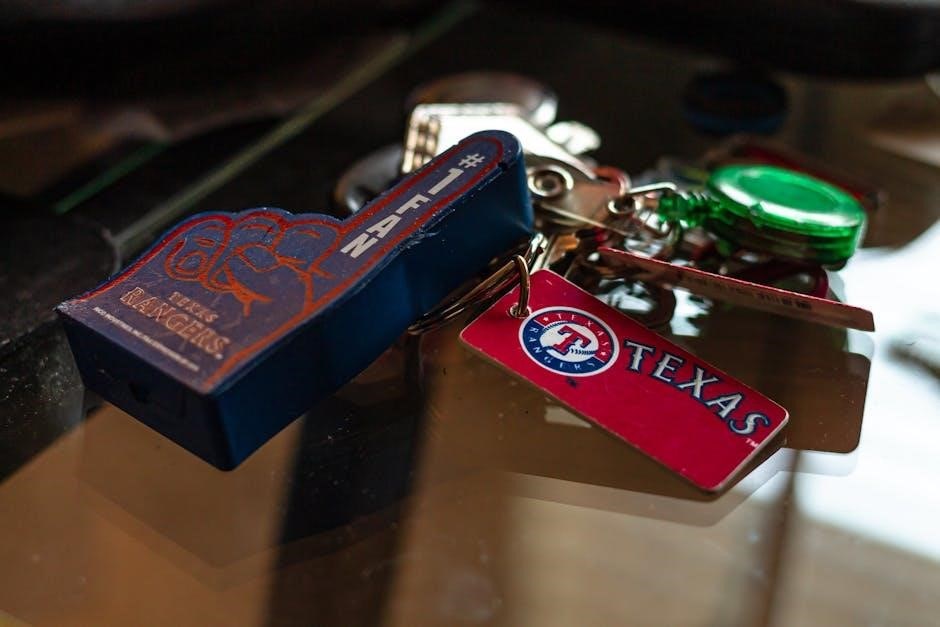Overview of Texas Gift Deed
A Texas Gift Deed is a legal document transferring property ownership without monetary exchange, often used for estate planning or gifting to family or charity. It ensures a legally binding transfer, requiring specific formalities to validate the transaction.
1.1 Definition and Purpose
A Texas Gift Deed is a legal document used to transfer ownership of real property from one party (the grantor) to another (the grantee) without receiving payment. Its primary purpose is to formally record the gifting of property, such as land or a home, often for estate planning, charitable donations, or to benefit family members. The deed ensures the transfer is legally binding and provides a clear record of ownership change, protecting both parties’ interests.
1.2 Legal Implications
Executing a Texas Gift Deed carries legal implications, including the permanent transfer of property ownership. Once finalized, the grantor relinquishes all rights to the property, and the grantee gains full legal title. This deed is irrevocable without the grantee’s consent, making it crucial for the grantor to ensure clarity and voluntariness in the transaction. Additionally, recording the deed with the county clerk safeguards the grantee’s ownership rights against future disputes or claims.

Key Elements of a Texas Gift Deed
A Texas Gift Deed includes grantor and grantee information, property description, consideration clause, and signatures. It ensures a clear and voluntary transfer of property ownership.
2.1 Grantor and Grantee Information
The grantor (giver) and grantee (receiver) details are essential in a Texas Gift Deed. The grantor’s full name, marital status, and address must be included, along with the grantee’s full name, marital status, vesting information, and mailing address. This section ensures clarity in ownership transfer. The grantor’s marital status is particularly important, as it may affect legal rights. Accurate and complete information is crucial for the deed’s validity and to avoid future disputes. Proper formatting and inclusion of all required details ensure the transfer is legally recognized.
2.2 Property Description
A detailed and accurate property description is crucial in a Texas Gift Deed. It must include the legal description of the property, such as lot and block numbers, or metes and bounds, as referenced in the original deed or survey. The street address and county where the property is located should also be included. This ensures the transfer is specific and unambiguous. A precise description prevents disputes and confirms the exact property being transferred. Inaccuracies can lead to legal issues or invalidation of the deed, making this section vital for clarity and enforceability.
2.3 Consideration Clause
In a Texas Gift Deed, the consideration clause is essential to establish the intent of the transfer. Since no money or other valuable consideration is exchanged, this clause typically states that the property is transferred “for love and affection” or as a gift. This language clarifies that the transaction is gratuitous, distinguishing it from a sale or exchange. The consideration clause ensures the deed reflects the grantor’s intent to make a gift, preventing future disputes over the nature of the transfer. It is a critical element for the deed’s validity and enforceability.
2.4 Signatures and Witnesses
The grantor must sign the Texas Gift Deed in the presence of a notary public to authenticate the document. While witnesses are not always required, their inclusion can provide additional validation. The grantor’s signature is essential to confirm their intent to transfer ownership. The notary public acknowledges the grantor’s identity and voluntary execution of the deed; This step ensures the document’s legality and enforceability, preventing future disputes. Proper execution is critical for the deed to be recognized by courts and recorded effectively.

Legal Requirements for a Valid Gift Deed in Texas
A Texas Gift Deed must be in writing, signed by the grantor, and acknowledged by a notary public. Delivery and acceptance are essential for its validity.
3.1 Valid Deed Format
A valid Texas Gift Deed must be in writing and adhere to specific formatting requirements. It should include the grantor’s and grantee’s full names, addresses, and marital status. A detailed description of the property, including its legal address or parcel ID, is essential. The deed must contain a consideration clause stating “for love and affection” or similar language. It must be acknowledged by a notary public and comply with Texas state laws. Ensure the document is typed on standard paper and signed by the grantor in the presence of witnesses or a notary, depending on county requirements.
3.2 Execution and Witnessing
The execution of a Texas Gift Deed requires the grantor’s signature, which must be acknowledged by a notary public. Witnesses are not always mandatory but may be required in certain counties. The deed must be notarized to confirm the grantor’s identity and voluntary execution. Proper witnessing and notarization ensure the deed’s validity and compliance with Texas state laws. This step is crucial for the legal recognition of the property transfer and for recording the deed with the county clerk’s office;
3.3 Delivery and Acceptance
Delivery and acceptance are essential for a Texas Gift Deed to be valid. The deed must be physically delivered to the grantee or their authorized representative with the intent to transfer ownership. Acceptance by the grantee is typically implied but may be explicitly stated. The delivery must be unconditional, ensuring the grantee assumes ownership. This step finalizes the transfer, making the deed legally effective. Proper delivery and acceptance are critical to enforce the deed’s validity, even though recording is a separate process.
3.4 Recording the Deed
Recording a Texas Gift Deed is crucial for making the transfer public and protecting the grantee’s rights. The deed must be filed with the county clerk’s office in the county where the property is located. This process involves submitting the signed and notarized deed, along with any required fees. Once recorded, the deed becomes part of the public record, providing legal notice of the ownership transfer. While not mandatory, recording is highly recommended to prevent disputes and ensure the grantee’s ownership is recognized. Failure to record may lead to legal complications in the future.

3.5 State-Specific Laws
Texas gift deeds must comply with state-specific laws to ensure validity. The deed must include the grantor’s full name, marital status, and the grantee’s full name, marital status, vesting, and mailing address. Texas law requires explicit language stating the transfer is a gift, with no consideration exchanged. Additionally, Texas allows individuals to remove personal information like Social Security or driver’s license numbers from the deed before recording. While Texas does not impose state gift taxes, federal gift tax laws may apply. Consulting a legal professional is recommended to navigate these requirements effectively.

Step-by-Step Process to Complete a Texas Gift Deed
- Prepare the deed with grantor and grantee details.
- Fill in property description, consideration clause, and signatures.
- Execute the deed before witnesses and a notary.
- Deliver the deed to the grantee.
- Record the deed with the county clerk.
4.1 Preparing the Deed
To prepare a Texas Gift Deed, gather essential information such as the grantor’s and grantee’s full names, marital statuses, and addresses. Include a detailed property description, including the legal description and address. Ensure the deed states “for no consideration” to confirm it’s a gift. Obtain a downloadable Texas Gift Deed PDF form from a reliable source or legal aid service. Review the form to ensure it meets all legal requirements and includes spaces for signatures, witnesses, and notarization. This step ensures accuracy and compliance with Texas state laws before proceeding.
4.2 Filling Out the Form
Filling out the Texas Gift Deed form requires precise information. Include the grantor’s and grantee’s full names, addresses, and marital statuses. Provide a detailed property description, including the legal description and address. Ensure the deed states “for no consideration” to confirm the transfer is a gift. Fill in the date and location of the transfer. Verify all fields are completed accurately, as incomplete or incorrect information may lead to legal issues. Ensure the form aligns with Texas state requirements before finalizing.
4.3 Executing the Deed
Executing the Texas Gift Deed involves signing the document in the presence of a notary public. The grantor must sign the deed, and while the grantee’s signature is not legally required, it is recommended for clarity. Witnesses may also be required, depending on local laws. Ensure the notary acknowledges the grantor’s signature. The deed must be delivered to the grantee, either physically or by mail, to complete the transfer. Proper execution ensures the deed’s validity and enforceability under Texas law.
4.4 Delivering the Deed
Delivery of the Texas Gift Deed is a critical step to finalize the transfer. The grantor must physically or electronically provide the signed deed to the grantee, ensuring the grantee acknowledges receipt. Delivery can be done in person, by mail, or through certified delivery services. Proper documentation, such as a signed receipt or certified mail tracking, is recommended to confirm the deed’s delivery. This step ensures the transfer is complete and legally recognized, fulfilling the grantor’s intent to gift the property.
4.5 Recording the Deed
Recording the Texas Gift Deed with the county clerk’s office is essential for public record and legal validation. The original signed and acknowledged deed must be submitted to the recorder’s office in the county where the property is located. This step provides public notice of the transfer, protecting the grantee’s rights and ensuring the transaction is legally recognized. Recording fees may apply, and the process typically includes indexing the deed for future reference. Proper recording guarantees the transfer’s enforceability and prevents future disputes or claims against the property;
Frequently Asked Questions
Common questions about Texas Gift Deeds include tax implications, revocation processes, and notary requirements, ensuring clarity on legal and procedural aspects of the transfer.
5.1 Tax Implications
A Texas Gift Deed may have tax implications for both the grantor and grantee. The grantor may avoid certain taxes by gifting property, while the grantee may receive tax benefits. However, the grantor must ensure the transfer complies with IRS guidelines to avoid gift tax liabilities. The grantee assumes the property’s tax basis, which could impact future tax obligations. Consulting a tax professional is recommended to navigate potential exemptions and ensure compliance with state and federal tax laws.
5.2 Revoking a Gift Deed
In Texas, revoking a gift deed is challenging due to its legally binding nature. Once delivered and accepted, the deed is typically irrevocable. However, if the grantor can prove fraud, undue influence, or mistake, a court may overturn the transfer. Mutual agreement between the grantor and grantee to rescind the deed is another pathway, requiring a written agreement and recording. Legal counsel is essential to navigate the complexities and ensure compliance with Texas property laws when attempting to revoke a gift deed.
5.3 Notary Requirements
In Texas, while notarization of a gift deed is not legally required, it is highly recommended to ensure the document’s authenticity and validity. A notary public can verify the grantor’s identity and confirm that the signature was made voluntarily. This step adds an extra layer of legal protection and helps prevent disputes. The notary will stamp or seal the document, providing official recognition. While state law does not mandate this process for gift deeds, it is a common practice to enhance the document’s credibility and streamline potential future transactions or recordings.

Resources for Obtaining the Form
Obtain a Texas Gift Deed form by downloading it from official legal websites, using online platforms like PDFSimpli, or consulting legal professionals for assistance.
6.1 Downloading the Form
The Texas Gift Deed form can be downloaded from official legal websites and platforms such as PDFSimpli. Available in PDF and Word formats, it’s free to download, fill out, and print instantly. Many sites offer guides to ensure accuracy, making the process straightforward and convenient for users to obtain and complete the form securely. This method is efficient and user-friendly, perfect for individuals looking to transfer property as a gift without legal assistance.
6.2 Using Online Platforms
Online platforms like DocHub and pdfFiller provide convenient access to Texas Gift Deed forms. Users can edit, sign, and share documents directly from their devices without downloading software. These platforms offer templates and guides to ensure accuracy and compliance with Texas laws. They also support electronic signatures, streamlining the process for all parties involved. This method is particularly useful for those who prefer a digital approach, making the preparation and execution of the gift deed efficient and hassle-free. Many platforms offer free trials or affordable subscriptions for seamless access.

6.3 Consulting Legal Professionals
Consulting legal professionals ensures the Texas Gift Deed is executed correctly and complies with state laws. Attorneys can review the document for accuracy, address complex situations, and provide guidance on legal implications. They help prevent errors, ensuring the transfer is legally binding and protects both parties’ interests. Legal professionals can also assist with unique circumstances, such as joint ownership or tax considerations. Their expertise offers peace of mind, guaranteeing the deed meets all requirements and avoids potential disputes or legal challenges in the future;



